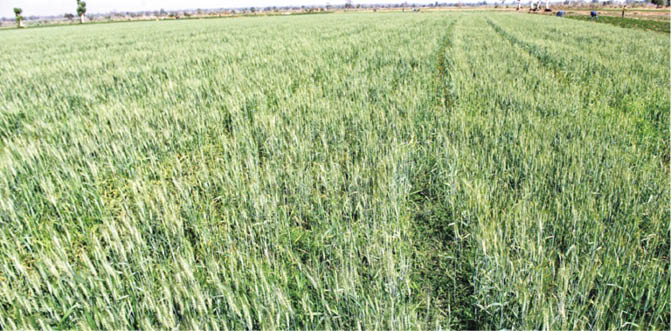Despite dam closure, late seed distribution, Kano wheat farmers optimistic
Amidst farmers’ fear of possible wheat shortage in Kano State this year due to issues attributed to water availability and late seed distribution, they are optimistic for a better season. The closure of the main water supply channel to about five wheat producing local government areas in the state have raised serious concern among farmers […]

FILE PHOTO: Wheat farm
Amidst farmers’ fear of possible wheat shortage in Kano State this year due to issues attributed to water availability and late seed distribution, they are optimistic for a better season.
The closure of the main water supply channel to about five wheat producing local government areas in the state have raised serious concern among farmers in the state.
Our correspondent in Kano reports that in the Central Bank of Nigeria’s (CBN) intervention under the Anchor Borrowers scheme, wheat farmers were so worried that input distribution was a little bit late.
This is because wheat can only be done during the cultivation window, which normally commences from November 15 every year.
Daily Trust on Sunday gathered that the closure of Tiga Dam on November 1, 2021, which will last for five months, would definitely affect irrigation activities, especially wheat farming; as such, wheat farmers have been complaining that they were left with no option than to pave way for themselves to survive the closure.
It was also gathered that some of the wheat farmers resolved to use the few water reservoirs in anticipation that they would be able to produce wheat, no matter the quantity, for this year, while some farmers have folded their arms, waiting for another planting season.
Investigations by Daily Trust on Sunday revealed that when hope for wheat farmers seemed to be lost, the Kano State wing of the Wheat Farmers Association of Nigeria (WFAN), under the Anchor Borrower scheme, mobilised farmers to open up new farms in some selected areas this year.
Malam Ilya Musa, a wheat farmer, said he had acquired hectares of farmland at Ajingi and grown wheat from the inputs he had received under the Anchor Borrower scheme. He explained that from the information and what they had started to notice, the seeds given to them are an early yielding variety with expected high yield.
“From its germination and growth, we have noticed a tremendous improvement from the seeds we were using initially. The seed obtained under the Anchor Borrower scheme is quite different from what we were used to in terms of germination, and as such, we are optimistic that our fears of not having wheat this year would be no more.
“Many of us have moved from the Kadawa irrigation site due to lack of water, to this place; and the good news is that most of us have taken almost twice the size of farms we were utilising. I am sure we will produce adequate wheat this year as against our initial fears,” he said.
Similarly, the state chairman of the WFAN, Alhaji Musa Shehu, revealed that wheat farmers were initially scared of the season due to the closure of the dam, adding that they were using over 40 per cent of the 22,000 hectares of irrigation field at the Kadawa site.
Shehu explained that with the Anchor Borrower scheme, wheat farmers in the state had received improved seed variety and other inputs. He added that farmers had moved to other fields for this year’s production.
“Improved seeds and other required inputs have been distributed to farmers under the Anchor Borrower scheme. We thought the timing was late, but experts told us that we stood a better chance as the weather had changed.
“Our members have moved out from the water shortage areas to other places and rented farms. From all indications, wheat farmers in Kano State will record a bumper harvest this season despite all odds. The seeds are hybrid and early yielding,” he said.
It would be recalled that the recent closure of Tiga dam, which serves as the main source of water to the irrigation sites in about five local government areas of Kano State, has been opposed by the farming communities. It generated a lot of concerns from farmers, who claim that it would negatively affect farming activities in the state, especially during this year’s dry season; and it poses a threat to food production.
